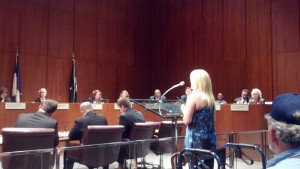Toledo food trucks get reprieve from costly fee, regulations

By Maggie Thurber | for Ohio Watchdog
SCRAP IT: Restaurateur Donna Weiser wasn’t happy that food trucks are across the street from her every day, but even she told council to scrap the law in favor of letting everyone work together to craft regulations all could support.
The message to Toledo City Council was loud and clear: We don’t need a new, costly licensing regulation for food trucks.
More than 100 people packed the Committee of the Whole meeting Tuesday to weigh in on a new food truck licensing law from Mayor D. Michael Collins.
But before council began, the administration circulated a new version of the ordinance.
It didn’t matter. Council President Paula Hicks-Hudson, a Democrat, announced that no vote would be taken on the proposal. Instead, council would listen to what the “experts in the audience” had to say.
District 6 Councilwoman Lindsay Webb, a Democrat, chided the administration for how the ordinance was developed.
“I’ve been on council for seven years and I’ve learned there’s an easy way and hard way” to create ordinances, she said. “This administration did it the hard way, crafting legislation without any input in the process from the stakeholders or from City Council. … That’s not a good message from a business-friendly city.”
Citing a “proliferation of on-street mobile food vendors,” the ordinance called for a $1,000 licensing fee, food truck zones, restricted days and hours of operation, limiting food truck length, restrictions on using generators, restrictions on advertising, additional liability insurance and a 100-foot minimum distance from the entrance to a brick-and-mortar restaurant.
And this was on top of existing vendor and health department licenses all eateries must obtain.
At-large Councilman Larry Sykes, a Democrat, asked how many food trucks there were, considering the administration’s use of the term “proliferation.”
Nine.
“The city had to react to nine trucks,” he asked. Turns out, proliferation is not the same as saturation, according to city Law Director Adam Loux.
So why a new law?
It was a response to complaints from restaurants and “to level the playing field,” Joel Mazur, the mayor’s assistant chief of staff, told council last week.
That didn’t sit well with Tom Baird, owner of the Ottawa Tavern and Wanderlust food truck.
“I hear a lot about leveling the playing field,” he told council. “Capitalism is not about leveling the playing field — it’s about competition. Having more competitors makes all of us better. This city is dying for new entrepreneurs, new people to risk capital and new people to help make this city better. I don’t think as a city we need to be regulating food trucks whatsoever.”
Phil Barone, owner of Rosie’s Italian Grille, was one of the first in the area to open a food truck.
He bought his truck with the understanding the city would allow him to operate it downtown two days a week. He said the city even installed 50-amp electrical service and he was “happy to pay for whatever we use, plus a service charge.”
Did the city bill him for the electricity?
“No, not yet,” Barone said.
Theresa Carroll, who co-owns The Tasteful Trolley, said she already invested more than $250,000 in her 33-foot trolley bus and that another $1,000 fee on top of all the other costs was “outrageous, at best.”
Her vehicle exceeds the proposed length restriction.
Donna Weiser, the owner of Ice Restaurant and Bar, said the food trucks are directly across the street. She was told initially it would only be two days a week, but now it’s every day. “It takes half my business every day,” she told council.
But even she opposed the law.
“I believe in a team approach,” she told council. “I believe we can work with the food trucks to compromise so none of us go out of business.”
Representatives of both groups gathered Monday to discuss the ordinance. They concluded they would rather work together to establish rules instead of having regulations imposed on them.
But Dave Ball, a downtown property owner who attended the gathering, dissented.
“I welcome competition and free enterprise,” he told council, “but at the end of the day, it’s not fair.”
He criticized one food truck owner who obtained a license in neighboring Wood County as “not devoted to downtown Toledo.”
Noting a $400,000 investment in his building, he said Barone hasn’t “spent a dime” on a building he owns downtown, and “instead he comes down in his truck and poaches customers and then goes back home.”
Ball said it “makes no sense” to “allow food trucks to use parking and compete with people who’ve made a real commitment” to the city.
“At the end of the day it has a negative effect,” he said. “When you analyze the economics of it, it will destroy the current businesses. We’ll see restaurants and bars close.”
That argument didn’t resonate with At-Large Councilman Steven Steel, a Democrat.
“I get the impression too many think it’s a limited pie,” he said. “It’s not a finite pie — that anything the food trucks make I lose. We have to be growing the pie and that‘s what I think the food trucks can contribute to: to grow that downtown pie — to enhance, not take away, from the businesses.”
Steel listed several objections to the proposal, but emphasized that the 100-foot distance was already part of city code. He recommended returning the legislation to the mayor.
Council agreed.
Hicks-Hudson promised to form a task force composed of various stakeholders.
That pleased food truck operator and restaurateur Hector Cordero.
“Without that food truck, I wouldn’t be in Toledo,” he said. “I’d be gone. There has to be a lot more discussion. (Ball) may have $400,000 invested in a building, but I’ve got all I have invested. I want the city to continue to be friendly to me. I hope I can stay.”
You can reach Maggie Thurber via email at maggie@ohiowatchdog.org







